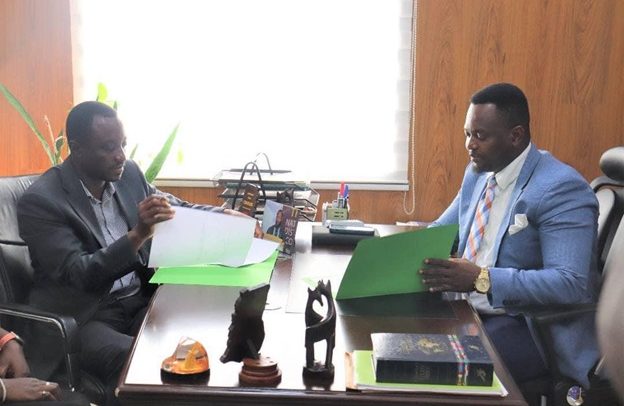Officials of the two organisations endorsing the agreements
THE AFRICAN Institute for Mathematical Science (AIMS) and the Centre for National Distance Learning and Open Schooling (CENDLOS), have signed a memorandum of understanding (MoU) on the implementation of AIM-CEMC Mathematics and Computing Courseware online.
The course, meant for Junior High Schools (JHS) and Senior High School (SHS) students, aims at building the capacity of students and promoting technology-based mathematical learning.
The signing agreement also seeks to create a framework through which AIMS Ghana and CENDLOS could partner on student development activities and outreach programs.
Based on the cooperation of both parties, the project shall be implemented under a comprehensive programme on Education in Mathematics and Computing (EMC) and shall include the development of content for the training of teachers as well as content for the Mathematics and Computing to be used by Senior High and Junior High School students.
The President of Aims Ghana Centre, Dr. Prince Osei speaking said that AIMS Ghana, over the years, has been training students in STEM and innovation and through this project, “we shall scale up and reach out to Junior High and Senior High School students to learn mathematics and computing on any technological device as we believe the next Einstein will be African.”
The Executive Director of Centre for National Distance Learning and Open Schooling (CENDLOS), Nana Gyamfi Adwabour, addressing the team, said that the COVID-19 pandemic taught countries a bigger lesson, especially in the area of education since now, most countries, including Ghana, have inculcated digitisation in education.
According to him, “the over 1.2 million children who were displaced during the lockdown because schools were closed down can now learn from the comfort of their locations, without having to necessarily be in the classroom as a result of the introduction of campus and inbox.”
He added CENDLOS, through the five key areas of digitisation – policy, infrastructure, content, capacity building, and assessment – would ensure the project was effectively and efficiently implemented to build a better world.
BY Daniel Bampoe

